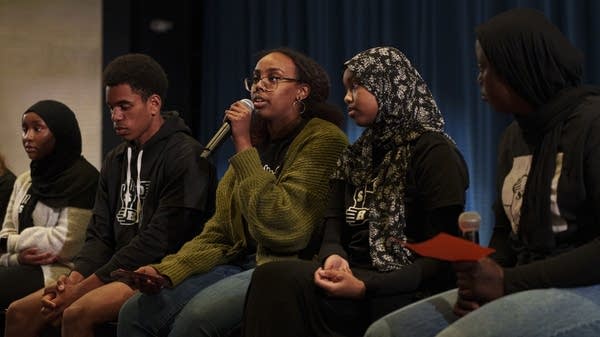Floyd’s death shaped how these students look at their lives

Go Deeper.
Create an account or log in to save stories.
Like this?
Thanks for liking this story! We have added it to a list of your favorite stories.
Stayci Spates, now a senior at St. Louis Park High School, was 14-years-old when George Floyd — a Black man — was killed. She remembers hearing about his murder on the news.
Stayci, who’s African American, was shocked and afraid.
“Because I've always had this fear that my father, who is an African American man, won't come home because he got pulled over,” she said. “So I just cried and my mom was still home and I just kind of cried in her arms.”

Stayci says she’d never really considered that something so hateful and racist could happen here in Minnesota. She thought it was the sort of thing that only happened in southern states.
Turn Up Your Support
MPR News helps you turn down the noise and build shared understanding. Turn up your support for this public resource and keep trusted journalism accessible to all.
“I was like, this is real. Like, it doesn't matter where you live,” Stayci said. “If you live in America, and your skin is dark. You can be killed at any given moment.”
That was three years ago. Stayci says Floyd’s killing has changed the way she lives her life. She’s more careful now to avoid anything that might expose her to law enforcement or accusation. She never speeds. She asks people she drives with to drive slowly. She never carries a large bag with her in stores to avoid accusations of shoplifting.

She’s become more aware of her racial identity and how it affects her experience in the world.
Stayci also joined a group at her school called Students Organized for Anti-Racism (SOAR). It’s a place where she says she and her classmates talk openly about race.
“Since I’ve been in SOAR I’ve learned to love my race more,” she said. “It allowed me to learn about the beauty and importance of my race as an African American woman.”
Floyd’s killing has had an impact on white students too.

Willis Gohman, a junior at St. Louis Park joined the anti-racist group a year after Floyd’s murder. He says it’s been the best part of his high school experience.
The group has been a space where students of different backgrounds can feel comfortable to speak freely.
“If I said something and it turns out I had this racist belief ingrained in me from society and I feel comfortable saying that, then I can be corrected,” he said. “But if that space wasn’t comfortable, I wouldn’t say it and nothing would change and I wouldn’t be educated.”

Willis wishes there were more places in his school where race and racism were openly discussed. It’s one of the reasons he was happy to support his classmates hosting a school assembly to mark the anniversary of Floyd’s killing, ending with a moment of silence matching the length of time that officer Derek Chauvin kneeled on Floyd’s neck and back.
“Please just reflect on the past three years and what has happened,” said SOAR leader Calvin Zimmerman, who helped lead the event. “We’re doing this because this was the amount of time that George Floyd suffered in his last moments.”

Dozens of students attended the event — fewer than in past years. That was by design, says Lee-Ann Stephens who advises the student group. She said students wanted attendees who were ready for a conversation.
“The event today was definitely student initiated,” said Stephens. “They really wanted to follow up after three years and find out what are people really doing since 2020, since the murder of George Floyd.”

Stephens is proud of the work the students have done — the conversations they’ve initiated and the community of support they’ve built. But she sometimes worries there aren’t enough other places in Minnesota where students are being given the space and tools to do this sort of work.
“What switch went off that we now don’t have to be committed to Black Lives Matter? What happened that we don’t have to be committed to making sure anti-racism is in the fore-front?”
If we forget what happened three years ago, Stephens says, we won’t make the progress against racism that’s needed.



